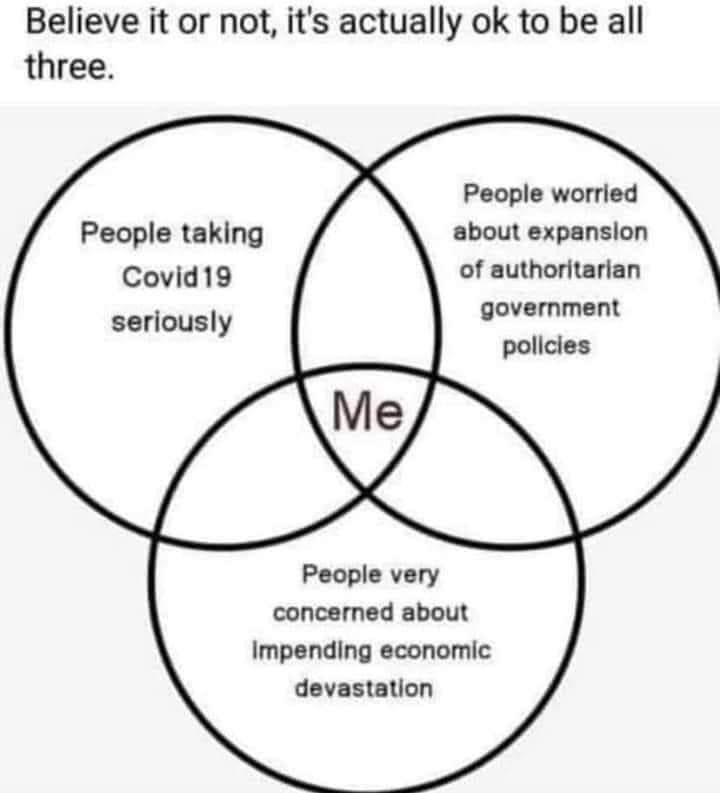“The policy of letting a hundred flowers bloom and a hundred schools of thought contend is designed to promote the flourishing of the arts and the progress of science”
Communist Party Chairman Mao Zedong
One of the interesting things about the Covid-19 pandemic is … well, that were are living in “interesting times”. It’s an interesting times for mask to fall, even when many put them up. And yeah, when entering a store, sure. Property rights are a thing. If the story owner demands it, I either wear it or shop somewhere else. And I do, regarding the store closest to home (on the ground floor, to be exact), which wants me to use a shopping cart. Fuck it, I shop somewhere else.
But yeah, the Covid situation is interesting. Personally, I think the following two memes capture my position perfectly. First, regarding the development:

And yeah, in the beginning, I was very concerned. The exponential growth, human problems with grasping these kinds of developments, misleading information (no need to stock up on food), heck yeah I took it seriously (or didn’t I?).
But today, it’s the May situation above and — in general — much like this Venn diagram:

And I totally agree with the digram (and yeah, as someone on Twitter mentioned, strange that some had to put it this way).
And yeah, there just so many … inconsistencies.
Of course, we live in a complex world. Nothing can be completely consistent. But some things still are … strange.
There is the strange “equality of outcome” undercurrent. Like no matter who did the work, all must profit. Doesn’t this just remove the incentive to do … well, exceptional work? And who sets the standard for this “equality of outcome”. Which (fictional) average (or minimum) should we be equal to? An 80-year old decrepit husk of a person? Who sets the standard? And which geographical or social/demographic area should we adapt to? Who sets the standard there?
Then there is the attempt to just throw money on it. Apparently, well managed money. Which echos the sage quotation:
«If it was up to the NIH to cure polio through a centrally directed program … You’d have the best iron lung in the world but not a polio vaccine.»
Samuel Broder, Former Director, National Cancer Institute
And yeah, we do have this tendency to look for overall, general solutions. Instead of looking at the individual case. Which might be a state, a city, a village, heck, even a single office building. But looking at individual aspects of cases seems to be … disfavored. Strange, considering many of those people claim to be able to manage a whole economy up until the tiniest aspect.
Much better (perhaps) it would be to go with this fictional quotation:
Kynes — direct, savagely intent Kynes — knew that highly organized research is guaranteed to produce nothing new. He set up small-unit experiments with regular interchange of data for a swift Tansley effect, let each group find its own path. They must accumulate millions of tiny facts. He organized only isolated and rough run-through tests to put their difficulties into perspective.
«Dune» by Frank Herbert
Would be nice to look afterwards (while considering other — confounding — variables) what works and what does not. But yeah, there’s a tendency for general solutions. Even worse, it’s a way to pass the buck.
Because we do have the tendency to look up for these general solutions. Perhaps at the country level, perhaps even going to the EU level. Nice to delegate responsibility, but also removing those who make decisions even further from feedback from those who have to carry out these decisions — and suffer under the resulting conditions. I severely dislike direct democracy (aka “bread and circuses”), but there is something to be said for personal responsibility.
(Update: Most) people who decide for whole groups (e.g., states, cities, universities, etc.) — no matter whether male or female — lack the balls(*) to make informed decisions if the evidence leads against the general trend.
Pity, really.
And yeah, lastly, to actually refer to the title of this posting, I also do wonder — what if this is a way to find out who — and how many — people follow blindly. And how many resist. And when. Might have been Mao’s goal, or might simply have been something to save the day. After — perhaps due to a lack of viewpoint diversity in the party — opening up the party to criticism, he just used the criticism as a way to identify dissenters.
And yeah, we do live in interesting times.
Ah, and one more thing … all those people who favor socialism, in the sense of “advocating collective or governmental ownership and administration of the means of production and distribution of goods” — how do you like a taste of it? Just forget the virus itself, just look at the current situation. The fallout. The “other things“. Like the government regulating private businesses and — even worse — what you may do at home. The lines in front of businesses. The control over people’s behavior … . That’s what you also get when you go for socialism. Socialism just sounds nice, until the money generated by the “enemy” is used up. Then … let’s put it this way, you don’t even want to be a pet in such a society. They get eaten when the food runs out. And it will.
P.S.: And (again) yeah, in a nutshell. I took the pandemic very seriously — in the beginning. But based on the figures, at the moment (unless it mutates into a much more dangerous strain), I think it’s akin to a severe flu. Just mentally replace “number of infected” with “number of immune”. And yeah, people die — sometimes because of it, but often while having it. But overall, we can manage. And personally, I know my values, and the prime value for me is freedom. And even … “checked by death” (well, a less than 1% chance) it supersedes the … panic about Covid-19.
(*) Strangely enough, one of those cases in which German is actually more apt than English. In German, the figurative equivalent for “balls” would be “Eier”. Literally it would be “eggs”, but figuratively it usually means “testicles” (in the non-polite way), but can also be used for “egg cells” (even if this is not used this way in common parlance). So, in a way, it would fit both men and women.